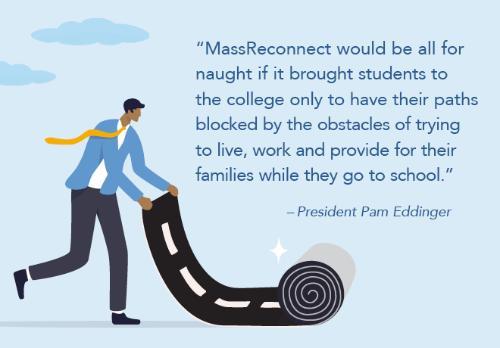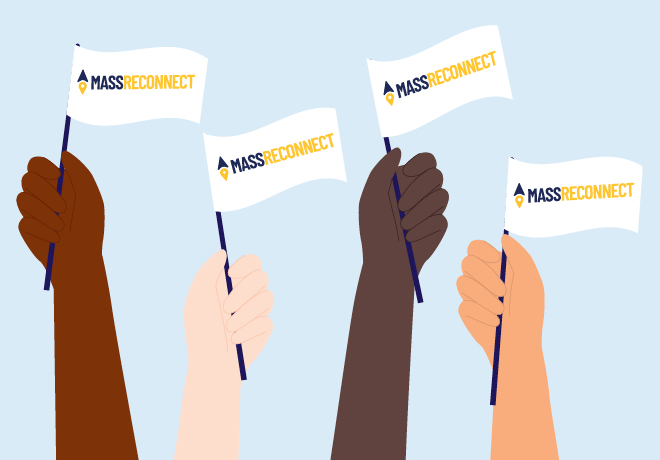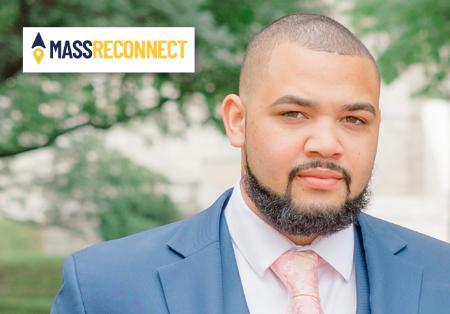
A Bold Leap
MassReconnect brings free community college to Massachusetts.
When Massachusetts Governor Maura Healey took to the podium in March just outside of the Mary L. Fifield Art Gallery on BHCC's Charlestown Campus to announce MassReconnect, the Commonwealth's free community college program for residents aged 25 and over, it was akin to an education moon landing: one small step for community colleges, one giant leap for the many students, faculty, leaders and advocates who had been working towards this day for years. It is an accomplishment, to be sure, but a beginning, not a conclusion.
The free community college movement has been a growing force across the country for much of the last decade, as organizations like College Promise and the Campaign for Free College Tuition have pushed for local, state, and national programs like MassReconnect, with the goal of making community colleges—and even all public colleges and universities—accessible to all.
 That movement has caught fire in recent years with statewide free community college programs developing across the country. Many advocates had hoped President Biden would include free community college nationwide in his Inflation Reduction Act last year. However, that part of the bill was dropped during the legislative process. Additional free community college bills, including Senator Bernie Sanders’s College for All Act, have been introduced in Congress since.
That movement has caught fire in recent years with statewide free community college programs developing across the country. Many advocates had hoped President Biden would include free community college nationwide in his Inflation Reduction Act last year. However, that part of the bill was dropped during the legislative process. Additional free community college bills, including Senator Bernie Sanders’s College for All Act, have been introduced in Congress since.
Healey voiced her support for a free community college program in Massachusetts in her inaugural address in January 2023, framing the program as a path to a more skilled and inclusive workforce: “Tens of thousands of jobs in healthcare, transportation, and technology are going unfilled because the skills of our workers don’t match the demands of our economy. Let’s work with our community colleges and vocational schools, and make sure the training we offer meets the needs of our companies in every region.”
The worker shortage is felt acutely in Boston. The region’s economy, heavily dependent on tech, life sciences, and medical sectors, has struggled to attract enough skilled workers to grow and thrive in Massachusetts. And while Massachusetts has one of the nation’s highest college-going rates, approximately a quarter of high school graduates do not go on to college and have far fewer opportunities for better-paying jobs and economic mobility.
“Workforce shortages have impacted nearly all sectors of our economy, but we have an incredible opportunity before us to train the next generation of workers and increase opportunities for all,” Healey said at the March announcement. “More students than ever before will be able to advance or complete their education and set themselves up for a successful career in in-demand industries like healthcare, engineering, advanced manufacturing, and tech.”
“The MassReconnect Program will be a game changer for community colleges and hundreds of thousands of Massachusetts residents,” said BHCC President Pam Eddinger. “Community colleges are the best tool we have to help people in every corner of the Commonwealth to rise and to build a skilled workforce that will ensure our state’s growth and prosperity for all.”
Empowering Dreams: Tuition Equity in Massachusetts
Leveling the playing field for every student's future
Adding to the excitement and celebration of free community college in Massachusetts was the inclusion of tuition equity for undocumented students at all public colleges and universities. The measure was included in the same state budget package as MassReconnect, signed into law in August.
It allows students with undocumented immigration status to qualify for in-state tuition and financial aid. The Massachusetts Taxpayers Foundation, a non-partisan public policy think tank, estimates that the measure will help approximately 350 students yearly.
“This is a big step forward for students who have been growing up here, learning here, living here, working hard here, following their dreams right here in Massachusetts,” Governor Maura Healey said in a press conference after the budget was signed into law. “It's nothing more than what is fair and what is right. They're going to be able to continue their journey on the same terms as their peers in a place that is their home.”
Massachusetts Commissioner of Higher Education Dr. Noe Ortega affirmed the vital role the program will play in both the higher education system and in the development of an inclusive and skilled workforce: “By supporting our students, we are investing in the future of the Commonwealth. With this new policy, we are strengthening our state’s economy, workforce, and communities.”
BHCC student Caio Rodrigues offered written testimony at a joint legislative hearing on the measure earlier this summer: “I graduated from high school in Somerville, MA, and now attend Bunker Hill Community College in Boston. I take a few classes at a time because it’s all I can afford. I have a GPA of 3.95 on a 4.0 scale and joined the honors society…I missed the opportunity to apply for DACA; this was out of my control because a federal judge in Texas halted new applications…My educational goal is to earn a doctorate in Astronautical Engineering and to follow that with a career in rocket science. I can’t wait for in-state tuition and aid to become a reality so I can be a full-time student.”
become eligible to do so. The new law covers both new and continuing students at all Massachusetts public colleges and universities.

MassReconnect was just one part of a historic set of investments in higher education included in Healey’s fiscal year 2024 budget, including an expansion of financial aid and wraparound services to students, campus investments, tuition equity for undocumented students who can now pay in-state tuition rates, and free tuition for community college nursing students—a broad package of education investments that acknowledge tuition, fees and educational expenses are only one part of the challenge.
“MassReconnect is going to be transformational,” said Eddinger, “but our philosophy is and will continue to be that there is No Wrong Door at BHCC. That means no matter how a student comes to us, and once they are here, no matter where they find themselves, they will get the guidance, the financial assistance, and services they need to be successful.”
No matter the source, funding for community colleges is widely viewed as one of the best educational investments. Locally, that has been borne out in a study conducted by public policy think tank MassINC, which confirmed significant return on investment to both individual students who attained a community college degree or certificate in Massachusetts and to taxpayers who fund the community college system, notably finding that for every dollar spent on a student who earns an associate degree, state taxpayers receive between $1.89 and $2.75 in benefits—a number that could be even higher with better rates of completion.
For students, MassReconnect is straightforward. It is a “last dollar” program that kicks in after all other federal or state financial aid dollars have been applied. Students do not have to apply for MassReconnect—they simply fill out the Free Application for Federal Student Aid (FAFSA), and MassReconnect funds are applied by the college so that after receiving all other sources of aid, the student does not have any Expected Family Contribution (EFC) toward their community college tuition and fees. It also offers a stipend for books and supplies.
To qualify for MassReconnect funding, a student must be a Massachusetts resident and high school graduate or GED holder who will be aged 25 or older when they start the semester and have yet to earn any previous degree. MassReconnect students must also enroll in at least six credits per semester (typically two three-credit classes) in a program leading to an associate degree or certificate.
An estimated 700,000 Massachusetts residents have some college credit but no degree. They, along with approximately 1.8 million residents with a high school diploma or equivalency but no college degree, would qualify for MassReconnect. The Massachusetts Association of Community Colleges estimates that as many as eight thousand residents will enroll in community college thanks to MassReconnect this year, with closer to 10,000 students in the 2024-25 academic year.
While MassReconnect and similar last- dollar programs cover the direct costs of community college, some are worried that the programs do not go far enough to cover significant expenses such as housing costs, transportation, or food. The complicated application process is also a concern.
“There’s a risk that MassReconnect could become quite convoluted where [students] don’t know their eligibility or don’t know how to navigate that process,” New America policy analyst Chris Geary told the Boston Globe at the time of the program’s launch earlier this year.
Geary and other policy analysts have noted that states such as Maine and New Mexico have waived tuition and fees for all residents without requiring the FAFSA or additional sources of aid.
Indeed, Massachusetts Senate President Karen Spilka saw MassReconnect as an important step towards a “shared goal of expanding access to community college, and proposed making community college free to all.”
Opening a pathway to higher education for historically underserved populations has been a hallmark of free community college programs across the country since the first of its kind debuted in 2015. The Tennessee Promise immediately kicked off double-digit annual enrollment increases and a climbing college-going rate. Similar programs in Michigan, California, and Texas have also boosted enrollments. Maine’s promise program grew enrollment by some 18% this year.
The growing momentum at the state level has outstripped the stalled federal initiatives to bring free community college to the nation, and propelled the free community college movement into orbit.
With MassReconnect still brand new, it’s too early to gauge the program’s long-term impact on BHCC enrollment and persistence. Initial signs are hopeful. Fortuitously, the program seems to coincide with a national resurgence in community college enrollment following a steady decline during the pandemic. This fall, BHCC enrollment has rebounded with an increase of close to 10%. Higher enrollment is anticipated in the spring when MassReconnect benefits become better known in the community.
BHCC has embraced MassReconnect not only as an expansion of access, but a promise of better student persistence and degree completion. “MassReconnect would be all for naught if it brought students to the college only to have their paths blocked by the obstacles of trying to live, work and provide for their families while they go to school,” said Eddinger. “We will continue to assist students with basic needs and wraparound services. These strategies combined with the benefits of MassReconnect will give our students a running start at academic and career success.”
MassReconnect is indeed like a moon landing. But the thing about the moon landing is that it wasn’t a miracle. Rather, it was the product of a decade or more of work, of building, of experimentation, and discovery. The moment it was realized—the giant leap—was not the end of the journey but a beginning, a journey that brought innovation and that turned our eyes to new frontiers long after it ceased to appear miraculous. So, it may be with the free community college journey, too: A small step that opens a new world and the possibility of a better present and future for all who want it.
Powering the Future
 Kevin Brito is one of the first BHCC students to receive MassReconnect funding, and it has given him a new opportunity and a fresh start
Kevin Brito is one of the first BHCC students to receive MassReconnect funding, and it has given him a new opportunity and a fresh start
“I had already taken out loans,” Brito said. “It was a relief to get to return that money...and know that I wouldn’t be going into debt to go to school.”
If Brito, who lives in Brockton and works in security, wasn’t aware of MassReconnect before, it has become the keystone of his nascent college career. Brito is enrolled in BHCC’s Electric Power Utility Training (EPUT) program, a unique program that offers students a paid internship with Eversource along with an associate in science degree and a certificate in natural gas technology. Graduates of the program can then interview with Eversource for a position in their field. Affordability and a high return on investment drew him to community college in the first place, and with MassReconnect, that equation has moved in his favor.
“A couple of years back, when I was thinking about trying to go to school, I knew that community college would be more affordable,” Brito said. “At work, I ran into older folks who had gone to [a four-year or private college] and had student debt they were still paying off. I always wanted to be financially sound. I never wanted to put myself in a position where I would have to make more difficult choices than needed, and at Bunker Hill, I get the same quality [as a four-year college] but at a fraction of the price.”
At 27, Brito is now a first-time college student, and like many BHCC students, the journey to college involved trying different learning settings and getting to know himself better. Brito graduated from TechBoston Academy but thought he needed more time to be ready to continue his education.
“I knew I wasn’t mature enough to go to college yet,” Brito said. “At the time, I wasn’t aware that I had [attention-deficit/hyperactivity disorder] ADHD. I had always had this issue where, at the beginning of the semester I’d do great, then I would fall off. I always had to be occupied with something else.”
Brito later joined Year Up, an educational nonprofit that promotes economic opportunity and pathways to upward mobility through job training and mentorship. Placed at State Street Bank as an intern, he felt that a traditional office job was not the right path for him. “I couldn't stay at my desk all day long,” he said. “I needed to be actively doing something, to physically move around.”
Working in security gave Brito a steady job and opportunities to advance. In the meantime, he got married and was learning how to manage his ADHD, but he still felt something was missing. When his now-wife went to college, he helped her with homework. “I always wanted to go back to school, not even for the degree, but for the atmosphere,” he said. “It’s one of those things I’ve missed.”
Now that the semester is off to a flying start, Brito is grateful for the unanticipated support offered by MassReconnect, which means not only is he not in debt, but his tuition, fees, and books are paid for. “When I walk into the building, I know my school is paid for, so my job is just to show up,” he said. “MassReconnect takes off that edge. I feel very comfortable walking into the building, knowing it is paid for.”

